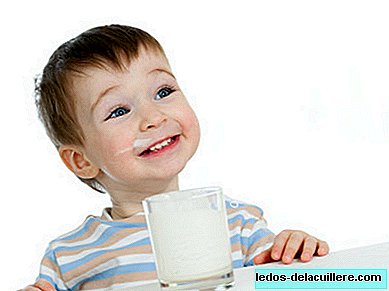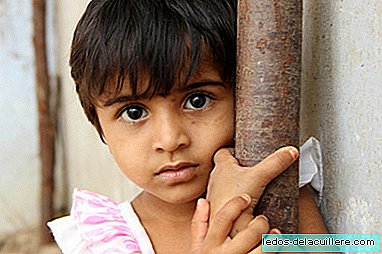
Today we celebrate World Milk Day, a date proclaimed by FAO (UN agency) to raise awareness about the importance of including this food in our diet for the multiple nutrients it provides, such as calcium, vitamin D and vitamins of group B, among others.
On the occasion of this celebration, on May 22 the Spanish Nutrition Foundation and the Ibero-American Nutrition Foundation through the presentation of its annual report, focused on highlighting the importance of consuming milk during pregnancy, since it helps to ensure a proper nutritional status of the mother and development of the baby. But milk is not only important during pregnancy; also in childhood and adolescence is key. We tell you what all its benefits are!
Milk, the main source of calcium
Cereals, legumes, vegetables ... there are several foods that contain calcium, but milk is, according to experts, the main and best source of calcium, both for the high levels it contains and for its high bioavailability, which facilitates the correct absorption by the body of this mineral.
A glass of milk contains 300 mg of calcium, the same amount as six servings of legumes or seven servings of vegetables. Dairy products are also an excellent source of calcium: a serving of cheese contains 500 mg and a yogurt around 180 mg.But milk is not only an excellent source of calcium, but also provides other essential nutrients for motor and cognitive development. It contains vitamins A, B2 and B12, vitamin D, minerals such as sodium, magnesium, potassium or phosphorus, carbohydrates (lactose), high quality fats and proteins, essential for the development of tissues and organs
The importance of calcium in the diet
Last year, the Spanish Nutrition Foundation and the Ibero-American Nutrition Foundation through its report "Milk as a health vehicle: calcium and its determinants in the health of the Spanish population", warned of the deficit of calcium and vitamin D which has 80 percent of the Spanish population. A fact certainly worrying.
The calcium It helps keep our skeleton healthy and strong, protects our teeth, helps us keep cholesterol at bay, and intervenes in proper coagulation and good cardiovascular health.
Therefore, this mineral is essential in the diet of all people, but especially in pregnant women, nursing mothers, women during menopause, children and adolescents.Calcium in the diet of pregnant women
During pregnancy, the baby needs calcium to build strong bones and teeth, as well as for a heart, coagulation systems and healthy muscles. If it does not receive enough calcium, it will "take it" from the mother's reserves, so it is essential for both the fetus and the pregnant woman that the calcium doses during pregnancy are adequate (between 1,200 - 1,300 mg / day)
"A pregnant woman needs 30 percent more calcium than any other adult person. That is why it is important to maintain a varied and balanced diet, in addition to resorting to supplements or foods fortified in calcium "- explains Professor Ángel Gil, president of FINUT.

In this sense, the former FEN and FINUT coincide in highlighting the importance of milk consumption during pregnancy, since its multiple nutritional properties contribute to avoid imbalances in the diet of pregnant women, which has a positive impact on the development and growth of the baby.
Calcium in children's diet
In the case of children and adolescents, calcium is especially important because it contributes to their growth, help in the formation and development of your bone skeleton, prevents osteoporosis and minimizes the risk of fractures, as well as cardiovascular disease, obesity and type II diabetes.
And again the milk, due to its composition and properties, acquires a great prominence at this stage, so experts recommend that be very present in the children's diet throughout its development, not forgetting puberty and adolescence, in which they need an extra supply of energy.
A daily calcium intake of 400 mg is recommended in the first six months, 600 mg in the second semester, 800 mg in the period between 12 months and 10 years and 1,200 mg during adolescence. This equals between two and four servings of dairy products a day, according to age.

Further, the consumption of cow's milk in children's age also brings long-term benefits, according to Dr. José Vicente Arcos, pediatrician specializing in Gastroenterology, Hepatology and Nutrition of the Hospital Sant Joan de Déu:
But let's not forget that for calcium to be absorbed by the bones, vitamin D is essential. Most of the vitamin D we need is manufactured by our own body thanks to exposure to sunlight and the practice of exercise.“Several studies show that the consumption of a sufficient amount of dairy products during childhood could reduce the risk of osteoporosis by increasing bone mass acquisition with growth, decreasing bone loss with age and reducing osteoporosis fractures, especially in women, although it is also true that other studies reflect that physical exercise is the fundamental determinant of bone accretion. In addition, some data suggest that it may even be protective against the development of high blood pressure "- said the doctor, in a report prepared by the company Bayer.
What if we don't drink milk?
There is no doubt that milk is an excellent food, and an important source of calcium and vitamins. However, either for health problems or for other personal issues, not everyone takes it, and in these cases it is important to know what other calcium rich alternatives should we incorporate into our diet.
During childhood, the cow's milk protein allergy (APLV), - the most common allergy in infants and young children - is the main reason that leads to removing this food from the diet. When this happens, experts insist on the importance of putting themselves in the hands of professionals to develop a balanced diet plan according to the child's age and nutritional needs:
"When there is APLV, the allergist along with a dietitian must establish an alternative dietary plan in which Calcium-rich foods are included as well as assess the administration of supplements. In these children it is very important to know that the status of vitamin D is good to facilitate the absorption of calcium from the diet to the maximum "- says Professor Ángel Gil, president of FINUT
The same would happen during pregnancy, lactation or, in general, any stage of life. And is that maintaining a healthy, balanced and varied diet there should be no nutritional deficiency.

There are many foods rich in calcium that by combining them correctly, and incorporating the appropriate amounts at each stage of development and growth, they should provide the recommended daily levels. For example:
Green leafy vegetables such as kale, chard, spinach or broccoli, and other vegetables such as cabbage or radishes.
Whole grains, especially oats and wheat.
Yolk.
Nuts such as hazelnuts, almonds, nuts and peanuts, and seeds such as sesame seeds.
Legumes such as beans, chickpeas and soybeans.
Fruits like dried figs
Fish such as sardines canned with spines, anchovies or small anchovies that are eaten with spine also contain calcium.
In cases where you want to drink a vegetable drink, it is important to keep in mind that these are not comparable to milk in terms of calcium intake, since they are naturally very poor drinks in this mineral, so that they should always be fortified or enriched.
Photos | iStock
In Vitónica | Milk Vs vegetable drinks: what does each one give us?












